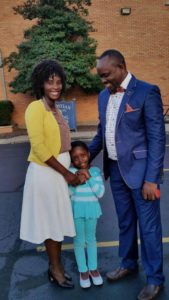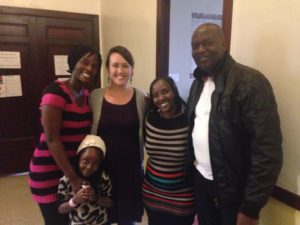Julienne came to the United States in 2007 by herself. Two days later, her parents and sisters arrived. They had fled conflict in their home country, the Democratic Republic of the Congo, to claim refugee status in Burundi. Now, Julienne is at her Louisville home on leave from work, resting as her mother Therese helps her care for her three-week-old baby boy, Ezra. Her husband Eric and her daughter Erica, age five, laugh and tease each other in the living room. When she arrived to Louisville in 2007, Julienne was engaged to Eric, yet he had to stay behind in Burundi. It took eight years for them to reunite.
“We met at our apartment complex in Burundi,” she says. “We started dating a year later.” After three years of separation, she returned to Burundi in 2010 to marry him and then returned again two years later so Eric could meet their young daughter, Erica.
To bring Eric to the U.S., Julienne worked with a KRM immigration attorney, Sarah Mills. “This is the type of case we don’t typically take,” Sarah says, because Julienne had started it elsewhere. She briefly lived in New York, and someone else helped her start the immigration application to bring Eric here. “If we aren’t the ones who start the process, it can be very difficult,” Sarah adds, explaining how, across the U.S., some individuals pretend to have legal expertise to assist with immigration applications. This is a crime in the United States. “They charge people money, yet they don’t sign their own name to the paperwork and they can incorrectly fill it out,” Sarah explains, sometimes ruining a person’s chances of reuniting with family. Despite this, she took the case. Eric remembers Sarah telling them, “Don’t worry. I will do my best.”
The process is complex, Sarah explains, requiring that the couple provide the personal details of their relationship to prove their marriage. In some countries, marriages may not have been celebrated in a way that the U.S. considers legal. Julienne and Eric completed intensive paperwork in the U.S. and in Burundi. Their case passed security clearances, biometrics testing, and more. “This job, it’s a lot of encouraging,” Sarah says. Throughout the process, Eric adds, “Sarah followed the case, emailed me in Burundi, and gave us any news.”
Ultimately, Eric was scheduled for an interview. He had to travel from Burundi to the Kenyan Embassy in Nairobi, a journey of over 600 miles. He didn’t know if he’d receive approval to travel to the U.S. or if he’d be sent back to Burundi with no hope of joining his wife or child. Embassies can be far away or in other countries, like in Eric’s case, Sarah explains. This may require applicants to travel long distances for appointments and interviews. They may not be welcome or safe in that country. Or, they may have nobody to stay with during the weeks or months they wait for the Embassy’s response.
Eric arrived in the United States on March 13, 2015, eight years after Julienne originally left for Louisville. A year later, their second child, Ezra, was born. Erica, now five, colors in their living room, telling the family how she knows Spanish, Kiswahili, Kirundi, French– and English. She recites different greetings. “I’m happy to see how you know the languages!” her father says. “Erica, are you Burundian?” He teases her. “No! I’m an American!” she responds.

Julienne and Eric now live together in Louisville with their daughter Erica, pictured here, and their son Ezra.
Soon, Julienne will return to her full-time shipping job at UPS, where her sister Monique also works. Eric worked at UPS for eight months as well. He transitioned to a higher-paying job at CEVA Logistics, working weekends so he can attend Jefferson Community and Technical College during weekdays. Julienne has a sister Nadine who works as a custodian at Jefferson County Public Schools. They all live nearby in the Louisville apartment complex with their families.
When Julienne’s sister Monique wanted help bringing her husband to the U.S., they turned to Sarah. Julienne’s other sister Nadine sought Sarah’s help to become a U.S. citizen in 2015. “She became family,” Julienne says of Sarah, “I love her!” Through this whole process, Sarah adds, “You really get to know the clients. To actually see someone arrive– it’s amazing.”

After working with Julienne and Eric, Attorney Sarah Mills also worked with Julienne’s sister Monique to help her reunite with her husband Pascal.
KRM Immigration Legal Services:
Reuniting with family depends on a person’s immigration status (such as permanent resident or U.S. citizen) and the relationship with the family member. For example, some parents may request to bring their children to the U.S. “When refugees flee conflict, families can get separated,” Sarah explains. “Sometimes they think their kids are dead. Later, they find out that they are alive and want to bring them here.” For most, like Julienne and Eric, the process requires years of waiting.
KRM’s immigration legal services include assistance applying for permanent residency, citizenship, family reunification, and more. Services in both Louisville and Lexington are open to the community. Learn more.

You must be logged in to post a comment.